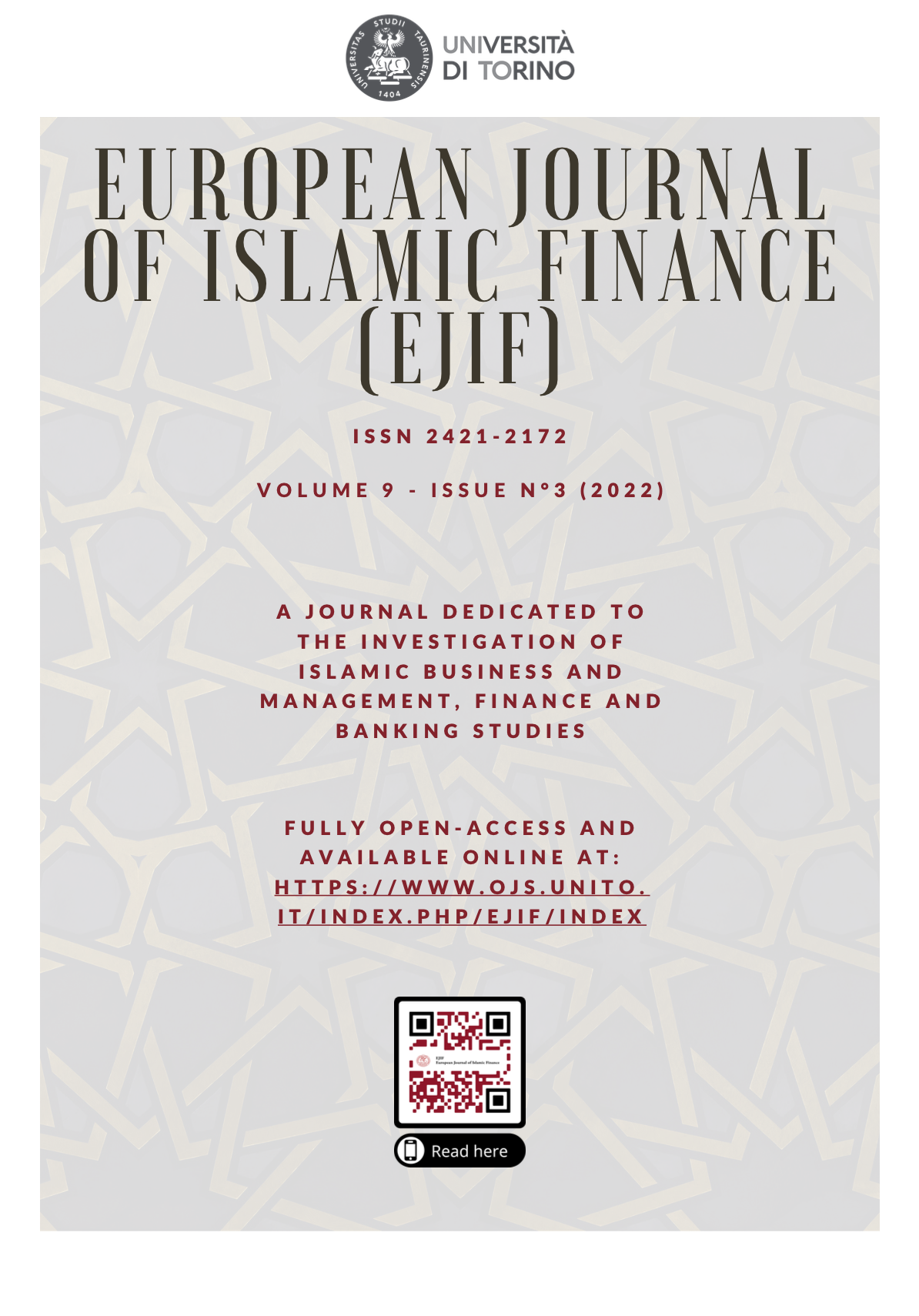A Critical Shariah and Maqasid Appraisal of Islamic Credit Cards
DOI:
https://doi.org/10.13135/2421-2172/6816Keywords:
Credit Card, Islamic Credit Card, Islamic Finance, Islamic Banking, Islamic Product DevelopmentAbstract
Islamic banks and financial institutions have recently started issuing Islamic credit cards as substitutes for conventional credit cards after the Shariah scholars, due to the Riba involved, unanimously deemed the traditional credit cards unlawful. However, Islamic credit cards have different structures; some have been structured based on Eina or Tawarruq sales even though these two types of deals were ruled unlawful by the Fiqh academies. However, the most common structure of Islamic credit cards is the Ijarah model, where the card issuer is deemed a lessor of the services embedded in the credit card, apart from the provision of credit, against fixed periodical fees. Although this structure seems acceptable from a Shariah point of view and has been endorsed by the Shariah boards of the issuing Islamic banks, it involves some issues that must be carefully addressed. The paper elaborates on these critical issues and analyses the different contractual relationships involved in these cards to outline the prospectus of a genuine Shariah-compliant credit card.
References
El-Komi, M. and Croson, R., “Experiments in Islamic microfinance”, Journal of Economic Behavior & Organization, Vol. 95, pp. 252-269, 2012.
Biancone, P.P., and Radwan, M.,, “European Companies: Evaluation for Sharia Compliance ‘Opportunities And Challenges,’” European Journal of Islamic Finance, no. 5, Jul. 2016.
El-Bassiouny, N., “The one-billion-plus marginalization: toward a scholarly understanding of Islamic consumers”, Journal of Business Research, Vol. 67 No. 2, pp. 42-49, 2013.
Dusuki, A.W. and Abdullah, N.I., “Maqasid al-shari’ah, maslahah and corporate social responsibility”, The American Journal of Islamic Social Sciences, Vol. 24 No. 1, pp. 25-45, 2007.
Jamshidi, D. and Hussin, N., “Determining a conceptual framework for adoption of Islamic credit card in context of Malaysia”, Journal of Basic and Applied Scientific Research, Vol. 3 No. 1, pp. 188-196, 2013.
B. J. Grim and M. S. Karim, “The future of the global Muslim population: projections for 2010-2030,” Washington DC Pew Research Center, 2011.
Biancone, P.P., and Radwan, M., “Sharia Compliant Possibility for Italian SMEs”. European Journal of Islamic Finance, No. 1, 2014.
Yılmaz, D., “Islamic finance: during and after the global financial crisis”, Arabian Journal of Business and Management, 2009
Reuters, "Islamic Finance Set to Cross $1 Trillion: Moody's," The Economic Times, October 21, 2010.
Biancone, P.P., and Radwan, M., “Social Finance and Financing Social Enterprises: An Islamic Finance Prospective”. European Journal of Islamic Finance, Special Issue, 2019.
Al-Enezi, M., Fiqh of Islamic Financial Engineering (in Arabic). Qassim: Qassim University, 2015.
Choo, S.Y., Lim, H.E. and Sanusi, N.A., “The consumer choice of Islamic-based credit card:an analysis of bivariate probit model”, in Sanusi, N.A., Harun, M. and Samsudin, S. (Eds), Readings in Islamic Economics and Finance, Universiti Utara Malaysia Press, Sintok, 2007
Johan, Z. J., & Putit, L., “Conceptualizing the Influences of Knowledge and Religiosity on Islamic Credit Card Compliance”. Procedia Economics and Finance, Vol. 37, pp. 480–487, 2016.
Norudin Mansor and Azman Che Mat, “Islamic Credit Card: Are Demographics a Good Indicator?”, Asian Social Science, Vol 5, No. 12, 2009
Johan, Z. J., “Shariah Compliant Credit Cards: Disputes and Steps Forward”. Journal of Emerging Economies and Islamic Research”, Vol. 6, No. 1, pp. 44-54, 2018.
Yee, C.S., Eam, L.H. and Sanusi, N.A., “The Consumer Choice of Islamic-based Credit Card: An Analysis of Bivariate Probit Model”, in Readings in Islamic Economics and Finance, Sanusi, N.A., Harun, M. & Samsudin, S., Ed.s. Sintok: Universiti Utara Malaysia Press, 2007.
OIC Fiqh Academy, Resolutions and Recommendations of the Council of the Islamic Fiqh Academy 1985-2000, Jeddah: Islamic Research and Training Institute & Islamic Development Bank, 2000.
Fineberg, G., “Mobile Credit: The Effect of Credit Cards on Consumer Spending in the United States in the Second Half of the Twentieth Century”. Penn History Review, vol. 20, n. 1, pp. 94 – 120, 2013.
Radishe, N., The Reality of Credit Cards. York: Hull Press, 2003.
AAOIFI, Shari’a Standards for Islamic Financial Institutions, Manama: AAOIFI, 2010.
Abozaid, A., Muslim Merchants’ Directory to Fiqh and Ethics, Beirut: Al-Risala Publishing House, 2004.
Capgemini, “Capgemini’s World Payments Report 2020: Will COVID-19 spark the end of cash payments?”, 2020. Available at: https://www.capgemini.com/news/capgeminis-world-payments-report-2020/ (accessed 08-June-2022).
Al-Kasani, Badai’ al-Sanai’, Beirut: Dar al-Kitab al-Arabi, 1982.
Ibn Qudamah, Al-Mughni, Beirut: Dar al-Fikr, 2002.
Al-Dasuqi, Hashiyah, Beirut: Dar Ihya’ al-Kutub al-Arabiyyah, 2005.
Abozaid, A., Contemporary Eina: Is it a Sale of Riba, Aleppo: Dar al-Multaqa, 2004.
Al- Nafrawi, Al-Fawakih Al-Dawani, Beirut: Dar al-Fikr, 1994.
Downloads
Published
How to Cite
Issue
Section
License
EJIF content is licensed under a Creative Commons Attribution 4.0 International License.
Authors keep the copyrights for their work and give the journal the work's first publication copyright, which is at the same time licensed under a Creative Commons License – Attribution, which in turn allows other parties to share the work with an acknowledgement of the work's authorship and initial publication in this journal.



 EJIF has been approved for inclusion in
EJIF has been approved for inclusion in  EJIF is a member of
EJIF is a member of  EJIF is indexed by
EJIF is indexed by  EJIF is listed in the ANVUR (Italian National Agency for the Evaluation of Universities and Research Institutes) as a scientific journal
EJIF is listed in the ANVUR (Italian National Agency for the Evaluation of Universities and Research Institutes) as a scientific journal

